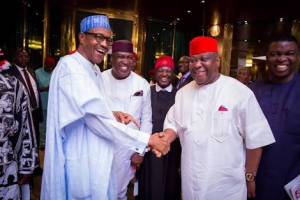President Muhammadu Buhari has once again played down reports and insinuations of bias against the people of south-east saying that he appointed four senior ministers from the zone.
While speaking on Thursday at a dinner for chieftains of the All Progressives Congress (APC) in Abuja, President Muhammadu Buhari, again tried to allay fears that he harbours a bias against the south-east, pointing out that he appointed four senior ministers from the zone where he got only 198,000 votes in 2015.
The president said he is fully aware of the issues confronting the country.
“There is something that hit me very hard and I am happy I hit it back at somebody. Seven states of the north are only represented in my cabinet by junior ministers, ministers of state.
“In south-east, I got 198,000 votes but I have four substantive ministers and seven junior ministers from there.
“You are closer to the people than myself now that I have been locked up here, don’t allow anybody to talk of ethnicity. It is not true.”
Recall that Buhari scored 198,248 votes in the five south-east states while Jonathan got 2,464,906 in the 2015 presidential election.
He said he enjoyed the supports of people of other ethnic groups and religious affiliations while he was struggling to be president from 2003.
“There is one thing that disabused my mind in a dispassionate way about ethnicity and religion across the country. You know that tribunal for presidential election started at court of appeal. The president was my classmate. I missed only four of the court sittings,” he recalled.
“For that first phase, 2003, we were in court for 30 months. My legal leader was Chief Ahamba (SAN), an Igbo man. He asked the panel of judges to direct INEC to produce the voters register to prove that the election was done underground.

“When they came to write the judgment, they completely omitted that. Another Igbo man, a Roman Catholic, in the panel of judges, wrote a minority report.
“I went to the supreme court. Who was the chief justice? An Hausa Fulani, a Muslim from Zaria. After 27 months, Ahamba presented our case for two hours and 45 minutes. The chief justice got up and said they were going on break and when they returned the following day, they will deliver the judgment. They went away for three months. That was what made it 30 months. And when they came back, they discussed my case within 45 minutes.
“In 2007, who was the chief justice? A Muslim from Niger state. The third one (in 2011), who was the chief justice? My neighbour from Jigawa State. The same religion and the same tribe.”


























